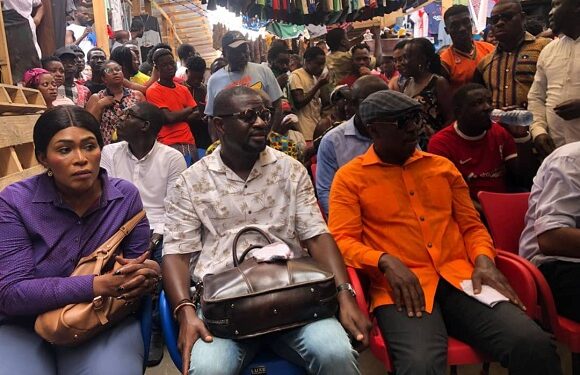The Minority Caucus in Parliament, led by Minority Leader Alexander Afenyo-Markin, has extended a helping hand to victims of the Kantamanto Market fire by donating GH¢200,000 to support affected traders in their recovery efforts.
The donation was made during a visit by the Caucus to the bustling commercial hub in Accra, where hundreds of traders were left devastated following a fire outbreak that swept through the market on January 2, 2025. The fire, which gutted large portions of the market, destroyed shops, stalls, and goods worth millions of cedis, leaving many traders grappling with massive losses and uncertainty about their future.
Speaking during the visit, Mr. Afenyo-Markin expressed heartfelt empathy for the traders who have been struggling to rebuild their lives and businesses.
“We appeal to the government to come to your aid. Recently, we approved the budget, and we are aware that the contingency fund is available to assist in times of crisis,” he said, urging state authorities to activate emergency relief mechanisms for the affected.
The Minority Leader also used the occasion to appeal to financial institutions that had offered credit facilities to the traders. He called on them to consider reviewing their loan terms, especially interest rates, to ease the burden on those who have lost their livelihoods.
In handing over the donation, Mr. Afenyo-Markin described the gesture as a “modest contribution” from the Minority, emphasizing the symbolic value of solidarity during such challenging times.
“This is GH¢200,000, it is a modest contribution from us, the mighty Minority, to support you,” he noted.
The donation, though modest in monetary value, was received as a gesture of hope and compassion by the affected traders, many of whom continue to count their losses and await support for reconstruction.
The Kantamanto Market, located in the heart of Accra, is one of Ghana’s largest and most vital centers for the sale of second-hand clothing and other goods. Over the years, the market has been plagued by recurring fire outbreaks, often attributed to poor electrical wiring, overcrowding, and lack of proper safety infrastructure.
This recent incident adds to a troubling pattern of market fires across Ghana that continue to displace small business owners and deepen economic vulnerability among urban informal workers. While investigations into the cause of the January 2 blaze are still ongoing, calls have intensified for comprehensive fire prevention strategies, infrastructure upgrades, and financial support for affected traders.
The Minority Caucus’ intervention adds to a growing chorus of concern and action from civil society, political leaders, and advocacy groups seeking sustainable solutions to the recurring market fire crises in the country.

































